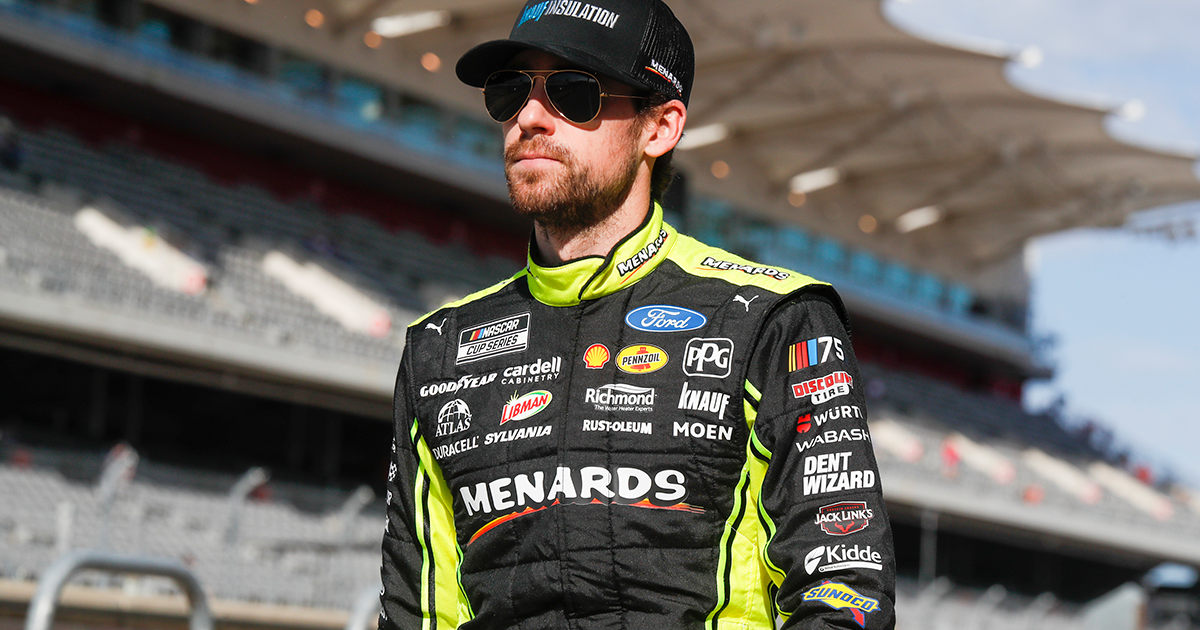“How does driving a car make you an athlete?”
“The car does all the work.”
“I commute on the Garden State Parkway, it’s the same thing.”
Ryan Blaney has heard all these gripes before. They’re always coming from some armchair quarterback who has never put on a fire suit or been anywhere near a car capable of hitting 200 mph, so the third-generation stock car driver has never paid much mind to it. After nine seasons competing in NASCAR’s Cup Series, Blaney understands it takes a true athlete to withstand the toll a race can take on a driver’s body and mind.
“It’s funny, I’ll give ride-arounds to other athletes—baseball players, football players—sometimes in a two-seater,” he says. “We’re going at least 50 mph slower than we do in a race, but it gets hot in there. We’re in the full fire suit and helmet, and after five laps they’re completely drenched in sweat and out of breath. And I’m like, ‘Yeah, we’d have 300 more laps to go with other cars out here in a real race.’ But at the same time, I can’t do what football players do, it’s a whole different type of conditioning.
“The hardest parts of it are the heat and staying locked into it for 500 miles while trying not to crash,” he laughs. “I tell people that driving a race car is easy, but trying to beat 39 other people is what makes it real tough.”
Racing was always around during Blaney’s childhood. His grandfather, Lou Blaney, was a dirt track legend, and his father Dave also raced in NASCAR’s top tier. And while Ryan dabbled in other sports like baseball and basketball, racing was in his blood.
“I’m five foot 10, a buck 45, I’m not going to make it in either one of those other sports,” he laughs. “Ever since I was born we were at the track every weekend, so I had a good knowledge of it as a kid because it was just everyday life for us. Luckily I took enough of a liking to it, so when I was 8 I gave it a shot, and my dad was there to help out every step along the way.”

Unlike most 8-year-olds, Blaney stuck with the sport he loved at such a young age. He’s logged thousands of hours in the driver’s seat over the course of hundreds of races, including over 250 in the Cup Series, the pinnacle of the sport. No matter how many miles he’s raced, he still feels a strong connection to the dirt tracks of his youth. His favorite Cup Series tracks—Martinsville, Bristol—are all on the short side, offering a much closer approximation to the racing of his youth.
“Everyone does the short track stuff when they’re a young teenager,” he says. “All the grassroots, weekend stuff is done on really small race tracks. I relate to that a lot [at tracks like Martinsville]. It reminds me of growing up, it has that same feel.”
Underneath his fire suit you’ll find another connection to Blaney’s past—a tattoo of the number 10. He got the tattoo sometime around 2013 and it was his very first piece. Much like his preference for short tracks, the tattoo was a link to his lineage and his own personal past.
“I got the number 10, my grandpa’s old number,” Blaney recalls. “It was something for my grandfather who had passed away a handful of years before I got it. It’s there on my chest to look at every morning.”
Blaney grew up racing as the number 10, just like his grandfather, but these days he’s got a 12 painted on his car (the team owners hand out the numbers in NASCAR). Which means he hasn’t stumbled upon anyone rocking the exact same tattoo as his first one, but he sees people with the number 12 in tribute to him often.
“It’s pretty cool to have diehard dedicated people who look up to you in a way,” Blaney explains. “That part is pretty special. I saw that as a kid with people coming up to my dad. I really appreciate those fans who come out and really support their [favorite] driver. I appreciate them as much as I can.
“It’s pretty neat when someone is like, ‘My kids love you, they look up to you,’” he continues. “I had drivers who I looked up to as a kid, but I never thought that would reverse one day. It’s a really bizarre thing, but it’s super special.”
Those who get it, get it. As a third-generation driver, Blaney is carrying on a family legacy every time he pushes that pedal to the floor, and he wouldn’t have it any other way.








